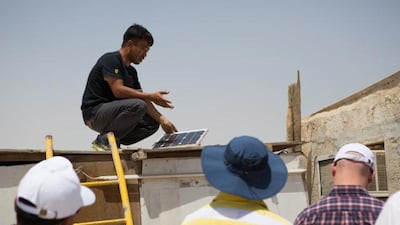DUBAI // A pilot project to provide solar power to rural farms is proving to be a success and could be expanded to the rest of the UAE.
Monyati Initiatives, a non- profit social development organisation registered in India and Germany, has so far installed solar panels at 17 farms near Mirfa, Abu Dhabi.
Work on the project started a couple of months ago and over the next few weeks 55 farms will be given the small panels, which each power a fan, lighting and mobile phones.
Monja Wolf, the founder of Monyati Initiatives and who is based in Abu Dhabi, said: “Most of our team have lived in the UAE for a number of years and we are excited about giving something back to the community,” she said. “We felt there was a need, perhaps more so in some of the rural areas, where we could be of help. Many people may not be aware but if you drive around the country you will notice these small farms dotted around the countryside.”
A pilot scheme was launched on cattle farms near Mirfa in May and that has now been extended to many more small farms and all will benefit once the solar installations are complete in a couple of weeks.
“We had about 19 volunteers from Abu Dhabi and Dubai help to install the panels, and I think it will make life easier for these farm workers, especially during the hot summers,” said Ms Wolf.
“Our aim with this project is threefold: to protect the UAE’s environment by using natural energy; to help rural families by enhancing their infrastructure; and to nurture a compassionate spirit within the country.”
As well as the panels, each farm receives a fan unit, two lamps and a mobile phone charger.
A solar-panel pack costs Dh550 and the project amounts to Dh30,000 in total. The funding for this phase of the project is secure but the organisation is now looking to expand.
“Funding for the panels and equipment has come from private donors and we always welcome support,” Ms Wolf said. “Hopefully, once we have completed this initial phase we can then move on, expanding to help hundreds more farmers. But to do that we require support from private donors, as well as from members of the public who volunteer their time to help out.”
Jay Vasudevan, 45, an Indian businessman from Dubai, was part of the team of volunteers who installed the solar panels.
“We split up into smaller groups so that it would be easier for us to cover more farms,” he said. “We put the panels up on the accommodation buildings for the workers and although it was a simple task it was made more difficult by the intense summer heat.
“We had to make sure that the panels were placed facing the Sun and at an angle of 30 degrees. Then we would connect the fan and lights and the mobile phone charger and it would take up to 40 minutes.”
The farmworkers are made up of expatriates, mainly from the subcontinent, and the new fans will come as a welcome relief during the hot summer months. “We’ve probably done almost 20 farms since we started a couple of months ago,” said Mr Vasudevan.
Since its inception in 2009, Monyati Initiatives has run several projects. These include building homes in the favelas of Sao Paulo, Brazil, to a lease loan scheme training women in Madagascar to drive tuk-tuks.
For more details on how to support Monyati Initiatives, visit www.monyati.org or email info@monyati.com.
nhanif@thenational.ae

